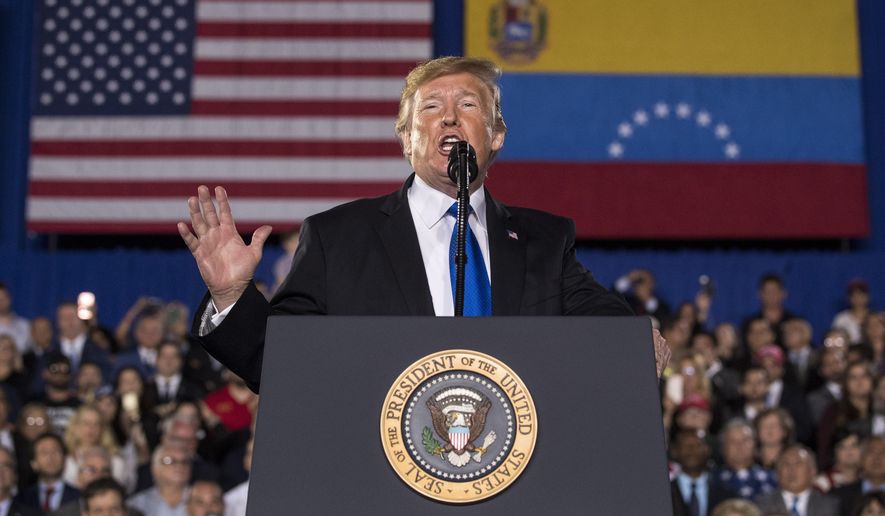President Trump urged Venezuela’s military leaders Monday to turn on leader Nicolas Maduro, casting the struggle in the troubled South American nation as a major test of whether the world can rid itself of a socialist stumbling block.
Speaking in Miami, the president also connected Venezuela to Cuba, saying Mr. Maduro has become a “puppet” of the communist regime in Havana.
He accused Mr. Maduro of denying his people medicine and other life-sustaining assistance to prop up his government, and he told Venezuelan generals they will lose everything unless they reject Mr. Maduro and back National Assembly leader Juan Guaido, whom the U.S. recognizes as the president.
“The eyes of the entire world are upon you — today, every day and every day in the future. You cannot hide from the choice that now confronts you,” Mr. Trump said in a speech to the Venezuelan expat community at Florida International University, about 80 miles south of his Mar-a-Lago estate.
While ostensibly aimed at South Americans whose cooperation is needed to oust Mr. Maduro, his remarks were also clearly aimed at a domestic audience of Venezuelan exiles who chafed at Mr. Maduro’s policies and now live in Florida, a critical swing state.
Their presence in the state has ballooned over the past five years, reaching an estimated 36,000 registered voters, according to one Bloomberg report.
SEE ALSO: Nicolas Maduro rejects Donald Trump’s ‘almost Nazi-style’ Miami speech
“They are seen by Republicans as sort of the next Cubans in terms of support,” said Susan MacManus, a politics professor emerita at the University of South Florida.
While Democrats focus on Mexican-Americans seething over Mr. Trump’s border wall or family-separation policy, or Puerto Ricans upset with the administration’s approach to Hurricane Maria recovery efforts, the president is expanding the GOP’s courtship of exiles from despotic regimes in Latin America.
More than once, Mr. Trump cross-referenced Venezuelans, Cubans and Nicaraguans as people who fled oppression in pursuit of American liberty and cheered the resistance movement in Venezuela.
“They are risking their lives and Venezuela’s future for a man controlled by the Cuban military and protected by a private army of Cuban soldiers,” Mr. Trump said. “Maduro is not a Venezuelan patriot, he is a Cuban puppet, that’s what he is.”
Alfonso Aguilar, president of the Latino Partnership for Conservative Principles, said there’s good reason for Mr. Trump to single out those nations.
“It highlights, once again, the Hispanic community is not monolithic,” he said. “It’s being smart. He’s identifying constituencies within the Hispanic community he can win.”
It also aligns perfectly with Mr. Trump’s new favorite target of the 2020 election — the Democratic Party’s increasing openness to socialist-style expansion of government services.
Mr. Trump said Venezuela is an example of socialist failure.
“A new day is coming in Latin America,” the president told an adoring crowd. “Socialism is dying, and liberty, prosperity and democracy are being reborn.”
Venezuelans rank roughly sixth in terms of Latino/Hispanic blocs in Florida — trailing Cubans, Puerto Ricans, Mexicans and Colombians, and nearly tied with Dominicans, according to Ms. MacManus.
Mr. Aguilar said many Venezuelans are settling in Miami-Dade County, a competitive area. And while it’s not a huge electoral bloc overall, “it’s big enough.”
“In a close election, it can make a huge difference,” he said.
Florida has been Ground Zero for close elections, with George W. Bush’s razor-thin victory over Al Gore in 2000 and Mr. Trump’s 2016 win by only a little more than 1 percent over Hillary Clinton.
In November, Sen. Rick Scott and Gov. Ron DeSantis — both Republicans — each won by less than 1 percentage point, underscoring the pivotal role the emerging Venezuelan bloc may play alongside Cubans, Colombians or Nicaraguans who fled similar circumstances.
“They voted Republican in the governor’s race,” Ms. MacManus said. “[Mr. DeSantis] had a strong anti-socialist platform that was well-articulated in southern Florida.”
Mr. Trump isn’t the only U.S. politician entering the fray in Venezuela currently.
Sen. Marco Rubio and Rep. Mario Diaz-Balart, both Republicans, visited a town on the Colombia-Venezuela border where international aid is being held up by Mr. Maduro, who fears the cargo of food and medicine is a pretext for U.S. intervention.
Mr. Rubio on Sunday tweeted pictures of overturned trucks and large containers that blocked the route into Venezuela.
Mr. Aguilar, for one, said he is surprised the growing field of Democratic primary candidates haven’t made the Venezuela situation as big of an issue as the president or specific Democrats — such as Sen. Robert Menendez of New Jersey — who are speaking out but aren’t on the ballot in 2020.
“They’re leaving a vacuum that’s going to cost them,” Mr. Aguilar said.
Some Florida Democrats did speak up Monday, however, calling on Mr. Trump to grant temporary protected status, or TPS, to Venezuelans fleeing Mr. Maduro’s regime.
TPS allows migrants who flee natural disasters, armed conflicts or other awful conditions to stay in the U.S. legally for a time. Latin American nations have been among the biggest beneficiaries, with some 200,000 Salvadorans still in the U.S. under TPS 18 years after a series of earthquakes struck their home country.
But the Trump administration has taken a dim view of TPS, attempting to finally end status for the Salvadorans and others.
Mr. Trump steered clear of TPS in his speech Monday.
Rep. Donna E. Shalala, who represents parts of Miami-Dade County, said nearly 22,000 Venezuelans filed for asylum in the U.S. in 2018 and they need immediate protections.
“The president has no business in South Florida,” she tweeted, “if he does not plan to extend TPS for Venezuelans.”
• Tom Howell Jr. can be reached at thowell@washingtontimes.com.




Please read our comment policy before commenting.